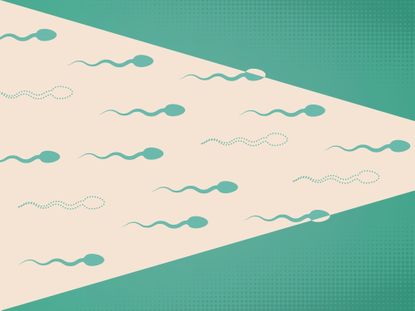Why is male fertility declining?
Sperm count has halved over the last 50 years. Should we be concerned?


Is the world in the midst of a male fertility crisis? Or are we overstating the problem? Here's everything you need to know:
How has male fertility declined?
Human sperm count has fallen by over 50 percent over the last 50 years, according to a 2022 study published in the journal Human Reproductive Update. Global birth rates are also at a record low, with more than 50 percent of the world's population living in countries "with a fertility rate below two children per woman," according to BBC. And low sperm count is not the only driving factor here — research has also indicated a decline in testosterone levels, as well as higher rates of testicular cancer and erectile dysfunction among men, per BBC.
"I think one of the fundamental functions of any species is reproduction," urologist Michael Eisenberg told CNN. "So I think if there is a signal that reproduction is in decline, I think that's a very important finding."
Subscribe to The Week
Escape your echo chamber. Get the facts behind the news, plus analysis from multiple perspectives.

Sign up for The Week's Free Newsletters
From our morning news briefing to a weekly Good News Newsletter, get the best of The Week delivered directly to your inbox.
From our morning news briefing to a weekly Good News Newsletter, get the best of The Week delivered directly to your inbox.
Overall, infertility affects one out of every six people in the world, according to a new report from the World Health Organization.
Why is male fertility declining?
The exact cause of the decline remains unclear, but some theories have emerged.
Lower sperm counts among men could come as a result of epigenetic changes, or "alterations to the way genes work, caused by environmental or lifestyle factors," as defined by BBC. "There are signs that it could be cumulative across generations," Hagai Levine, a professor of epidemiology, told the outlet. "This [declining sperm count] is a marker of poor health of men, maybe even of mankind."
Speaking of, a general decline in health could also be a factor. "There is a strong link between a man's reproductive health and his overall health. So it could also speak to that too, that maybe we're not as healthy as we once were," Eisenberg, the urologist, told CNN. Further, "stress of the mother, maternal smoking, and especially exposure to manmade chemicals that are in plastic, such as phthalates," can also disrupt the development of the male reproductive system," Levine added, speaking with CNN.
Even climate change and the environment could play a role. A 2022 study found that rising temperatures negatively impact sperm quality. Indeed, "heat stress is considered to be the most influential cause of reproductive function in mammals," the study said. Additionally, BBC writes, "chemicals found in plastics, household medications, in the food chain and, in the air," can cause DNA fragmentation or "damage or breaks in the genetic material of the sperm."
So is this cause for concern?
Opinions on the matter are mixed.
As Rachel Gross points out for The New York Times, "no one knows what an 'optimal' sperm count is." A person needs 40 million sperm per milliliter of semen to be considered fertile, and a count above that "does not mean a man is more fertile."
Further, "the way that semen analysis is done has changed over the decades. It has improved. It has become more standardized, but not perfectly," Dr. Alexander Pastuczak, a surgeon and assistant professor at the University of Utah School of Medicine, told CNN. "Even if you were to take the same semen sample and run it and do a semen analysis on it in the 1960s and '70s versus today, you'd get two different answers."
Even so, the matter "should be studied," Levine, the epidemiology professor, argued to BBC. "We are facing a public health crisis — and we don't know if it's reversible." The decline in both sperm quality and count could be indicative of a larger problem, he said.
Dr. Scott Lundy, a urologist at the Cleveland Clinic, agrees. "While it's not a cause for panic, because the counts are by and large still normal, on average," he told CNN, "there is a risk that they could become abnormal in the future, and we have to recognize that and study that further."

Continue reading for free
We hope you're enjoying The Week's refreshingly open-minded journalism.
Subscribed to The Week? Register your account with the same email as your subscription.
Sign up to our 10 Things You Need to Know Today newsletter
A free daily digest of the biggest news stories of the day - and the best features from our website
Devika Rao has worked as a staff writer at The Week since 2022, covering science, the environment, climate and business. She previously worked as a policy associate for a nonprofit organization advocating for environmental action from a business perspective.
-
 Today's political cartoons - December 2, 2023
Today's political cartoons - December 2, 2023Cartoons Saturday's cartoons - governors go Gotham, A.I. goes to the office party, and more
By The Week US Published
-
 10 things you need to know today: December 2, 2023
10 things you need to know today: December 2, 2023Daily Briefing Death toll climbs in Gaza as airstrikes intensify, George Santos expelled from the House of Representatives, and more
By Justin Klawans, The Week US Published
-
 5 hilarious cartoons about the George Santos expulsion vote
5 hilarious cartoons about the George Santos expulsion voteCartoons Artists take on Santa versus Santos, his X account, and more
By The Week US Published
-
 US life expectancy rose in 2022 but not to pre-pandemic levels
US life expectancy rose in 2022 but not to pre-pandemic levelsSpeed Read Life expectancy is slowly crawling back up
By Devika Rao, The Week US Published
-
 What's the microbiome and why is it so important?
What's the microbiome and why is it so important?The Explainer Our bodies serve as vibrant ecosystems for trillions of microbes
By Devika Rao, The Week US Published
-
 Malaria is spreading, but we can stop it
Malaria is spreading, but we can stop itThe Explainer Climate change is hastening the disease but medicine is catching up
By Devika Rao, The Week US Published
-
 The pros and cons of human genetic modification
The pros and cons of human genetic modificationPros and Cons Altering human DNA has both a lot of potential and a lot of ethical questions
By Devika Rao, The Week US Published
-
 What is a 'feminist approach' to cancer care?
What is a 'feminist approach' to cancer care?The Explainer 800,000 women die from 'preventable' cancers each year due to 'patriarchy', landmark study finds
By Harriet Marsden, The Week UK Published
-
 Animals and plants that have been used to fight disease
Animals and plants that have been used to fight diseaseThe Explainer The world's flora and fauna have long been medically important
By Devika Rao Published
-
 Heat harms the brain more than we think
Heat harms the brain more than we thinkWarmer temperatures could be affecting us mentally
By Devika Rao Published
-
 A flesh-eating bacteria is growing in numbers due to climate change
A flesh-eating bacteria is growing in numbers due to climate changeSpeed Read
By Devika Rao Published










